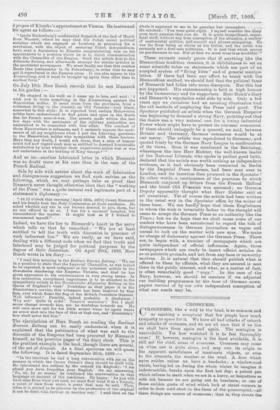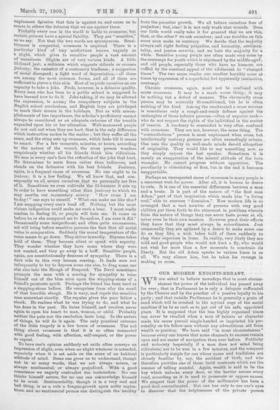CROSSNESS.
CROSSNESS, like a cold in the head, is so common and so catching a complaint that few people have much Sympathy to spare for it. We have all had attacks of catarrh and attacks of crossness, and we are all sure that if we live we shall have them again and again. The contagion is unavoidable. Yet how wretched it is to feel thoroughly cross If, however, contagion is the least avoidable, it is. Still not the chief, cause of crossness. Crossness may conic on when one is quite alone, aul may owe its origin to the apparent spitefulness of inanimate objects, or even to the elements, the weather or the wind. A door which never rattles unless we have a headache ; a wiudow-cord which, having led us during the whole winter to imagine it indestructible, breaks upon the first hot day; a patent pen which refuses to mark when we are in a hurry, or bespatters us with ink because we are going out to luncheon; or one of those sudden gusts of wind which lurk at street corners in order to dash cold sleet in the faces of the preoccupied,—all these things are causes of crossness; that is, they create the tinpleaaant delusion that fate is against us, and cause us to Create in others the delusion that we are against them. Probably every one in the world is liable to crossness, but Certain persona have a special liability. They are "sensitive," as we say. Not that the two words are synonymous. Sensi- tiveness is congenital, crossness is acquired. There is a particular kind of tiny misfortune known vaguely as a slight, which gives to sensitive people a vast amount of uneasiness. Slights, are of very various kinds. A little ill-timed jest; a criticism which suggests ridicule or arouses jealousy; the omission of a customary kindness; a suggestion of ;lethal disregard; a light word of depreciation,—all these are among the most common forms, and all of them are sufficient to pierce a thin skin. Most of us pride ourselves on our capacity to take a joke. Pride, however, is a delusive quality. Every man who has been to a public school is supposed to have learned how to do it. Joke-taking, if we may be allowed the expression, is among the compulsory subjects in the English school curriculum, and English boys are privileged to teach their sisters in the holidays. But as with accom- plishments of less importance, the scholar's proficiency cannot always be considered as an adequate outcome of the trouble expended upon his or her education. Well-mannered people do not call out when they are hurt, that is the only difference which instruction makes in the matter ; but they suffer all the same, and the sting sets up crossness, which lasts till it ceases to smart. For a few moments, minutes, or hours, according to the nature of the wound, the cross person wonders auspiciously whether all his friends think him ridiculous. He sees in every one's face the reflection of the joke that hurt. Ile determines to seem fierce rather than ludicrous, and stands on the defensive with his best friends. Jealousy, again, is a frequent cause of crossness. No one ought to be jealous; it is a low feeling. We all know that, and con- sequently we all „assure ourselves that we personally are free of it. Sometimes we even cultivate the ill-humour it sets up in order to have something other than jealousy to which we may ascribe our .momentary misery, "How cross I am to-day!" one says to oneself. "What can make me like this ? I am snapping every one's head off. Nothing but the most yiolent indigestion could make me such a bear. I must really confess to feeling ill, or people will hate me. It came on before he or she compared me to So-and-so, I am sure it did." Occasionally some insignificant, and often quite unconscious, eat will bring before sensitive persons the fad that all social value is comparative. Suddenly the moral temperature of the room seems to go down. They shiver inwardly. Shyness takes hold of them. They become silent or speak with asperity. They wonder whether they have come where they were not wanted, and they go away in a huff. Sensitive people, again, are constitutionally desirous of sympathy. There is a dark side to this very human craving. It leads men not infrequently to try to depress some one else, to drag some one else also into the Slough of Despond. The Devil sometimes prompts the man with a craving for sympathy to raise himself out of the blue 'mire upon the stepping-stone of a friend's prostrate spirit. Perhaps the friend has been used as a stepping-stone before. He recognises from afar the smell of that horrible slough. He is wary, and repels the sensitive man somewhat shortly. The repulse gives the poor fellow a
shock. He realises what he was trying to do, and what lie has done in the past. He hates himself, and resolves never again to open his heart to man, woman, or child. Probably neither the pain nor the resolution •lasts long. 'In the nature of things, he will do it again. The only practical outcome of the little tragedy is a few hours of crossness. The sad thing about crossness is that it is so often connected With good feeling, with affection, self-respect, or the power to repent.
To have one's opinion suddenly set aside often conveys an impression of slight, even when no slight whatever is intended, especially when it is set aside on the score of an habitual attitude of mind. Some one gives • us to understand; though not in so many words, that we are always severe, or always sentimental, or always prejudiced. • With a good conscience we eagerly contradict the insinuation. No one thinks himself severe, for no one can acknowledge himself to be cruel. Sentimentality, though it is it very real and bad thing, is as a rule a fungus-growth upon noble aspira- tions, and no sentimental person can distinguish the healthy
from the parasitic growth. We all believe ourselves free of prejudice; but, alas it is not only truth that wounds. Does our little world really take it for granted that we are this, that, Or the other ? we ask ourselves; and our troubles on this score soon make us contrary. We decide that the majority always call right feeling prejudice, and humanity, ,sentimen- tality, and justice severity, and we hate the majority for a while. Sensitive young people are often made very cross by the contempt for youth which is expressed by the middle-aged.; and old people, especially those who have no humour, are ruffled by the constant appeal of the adolescent to "changed times." The two sexes render one another horribly cross at times by expression of a superficial, but apparently instinctive, contempt.
Chronic crossness, again, must not be confused with acute crossness. It may be a much worse thing; it may be nothing but a defect of manner. The chronically cros's person may be naturally ill-conditioned, but he is often nothing of the kind. Among the uneducated a cross manner is sometimes only a rough-and-ready defence against the onslaughts of those inferior persons—often of superior rank— who do not respect the rights of the individual in the matter of reserve. A tendency to contradict is very often confused with crossness. They are not, however, the same thing. The "contradictions" person is most unpleasant when cross, but intellectually contrary persons are often exceedingly urbane. One sees the quality in well-made minds devoid altogether of originality. They would like to say something new, so they simply oppose the last speaker. Sometimes it is merely an exaggeration of the mental attitude of the born wrangler. He cannot progress without opposition. The peculiarity is stimulating at first, but in the end it becomes nsupportable.
Perhaps an unsuspected cause of crossness in many people is a recurrent wish for power. After all, it is human to desire to rule. It is one of the essential differences between a man and a brute. It is part of the nature of "the first man Adam," part of that inspiration which made him "a living soul," able to exercise "dominion." Now modern life is so arranged that a vast number of persona with very good abilities put them forth to the uttermost in positions wherein from the nature of things they can never taste power at, all, never even be their own masters. However great their efforts they know that they must always be subordinates. Just occasionally they are agitated by a desire to make some one do as they like, a wish takes hold of them suddenly to clap their superiors in irons. In reality, very likely they are mild and good people who would not hurt it fly, who would not wish for more then a few moments to constrain its liberty. But the old Adam speaks in various tones in us all. We may silence him, but he takes his revenge in making us cross.











































 Previous page
Previous page